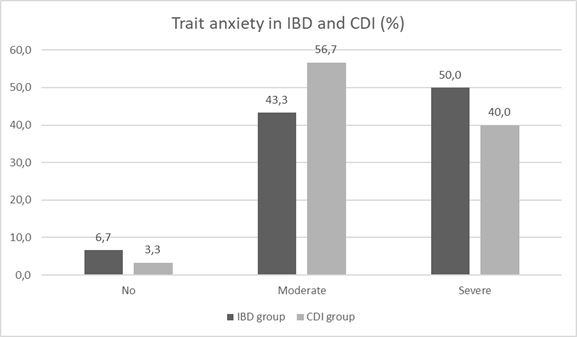P363 Depression and anxiety in Clostridioides difficile infection compared with inflammatory bowel disease during the Covid-19 pandemic
Țurcan, S.(1)*;Platon, V.(1);Negru, I.(1);
(1)State University of Medicine and Pharmacy from Moldova, Gastroenterology, Chisinau, Moldova- Republic Of;
Background
Numerous studies and their meta-analysis have shown a high prevalence of anxiety and depression in patients with inflammatory bowel disease (IBD): up to a third of patients with anxiety symptoms and a quarter with depression symptoms. These rates increase even more with high disease activity: up to half of patients with anxiety criteria and up to a third with depression symptoms.
Data on the frequency and severity of depression and anxiety in patients with Clostridioides difficile infection (CDI) are not so numerous and unambiguous. During the Covid-19 pandemic, the frequency of depression and anxiety increased among healthy individuals and, even more so, among patients with intestinal diseases.
The aim of the study was to evaluate the degree of anxiety and depression in patients with IBD and those with CDI during the Covid-19 pandemic.Methods
Thirty patients with IBD and 30 patients with CDI were included in the study. IBD was confirmed by endoscopy and histology. CDI was confirmed by enzyme analysis for glutamate dehydrogenase and toxins A and B in the feces of patients with nosocomial infection.
Hamilton scale (17 items) was used in order to assess the depression grade. This scale divides patients into four groups: no depression, mild, moderate and severe depression. Anxiety was diagnosed by the Spielberger scale (40 items) which includes analysis of State anxiety (SA) and Trait anxiety (TA).
Results
Depression was determined in 56.7% of patients in the IBD group: 46.7% had mild depression, and 10% moderate depression. In the CDI group depression was diagnosed significantly more frequently – 86.7% of cases: mild grade in 76.6% and moderate in 10%, predominantly among women.
SA was identified in 46.7% of patients in IBD group, and severe SA in 10.0%. In CDI group the frequency and grade of SA were similar: 40.0% and 13.3% respectively.
The of TA was extremely high in both groups: 93.3% in the IBD group, of which 50.0% with severe TA, and 96.7% in the CDI group, of which 40.0% with severe TA.
Conclusion
The results of the study confirm the presence of anxiety and depression in an extremely large number of patients with IBD and CDI during the Covid-19 pandemic. The frequency of anxiety and depression in this study is significantly higher than previously reported. Patients with IBD and CDI should be monitored for early diagnosis and adequate treatment of depression and anxiety.




